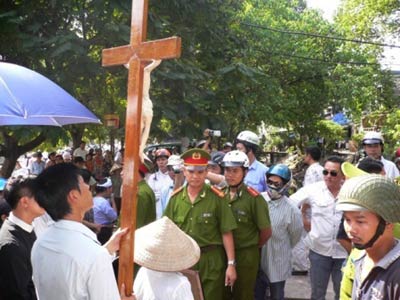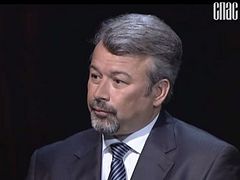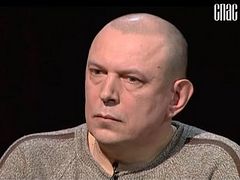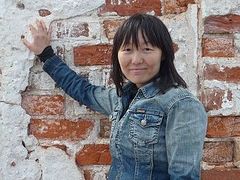We continue to publish the materials of Spas TV program My Path To God where Priest George Maximov interviews people who converted to Orthodoxy. Vietnamese Anna Dao Bin was a member of a Protestant community for a long time and did not even know that there were other Christian denominations. God led her to Russia where she discovered the truth of Orthodoxy. She will tell us about what she was looking for in Protestantism and found in Orthodoxy. We will also discuss the importance of the Holy Tradition and the significance of not only knowing but also understanding the Bible correctly, especially for missionaries.
 Anna Dao Bin
Anna Dao Bin Priest George Maximov: Hello! You are watching My Path To God. Today we will talk to Anna, our guest from Vietnam. I am very pleased to see an Orthodox Vietnamese, as I think that Vietnamese people are very interested in Christ. That is why there are so many Catholics among Vietnamese, almost 7 million, I think. Unfortunately, Orthodoxy has not reached them yet, although in the neighboring countries, Thailand and Cambodia, Orthodox communities are starting to appear.
Anna, could you tell us about your spiritual journey. How did it start?
Anna: I became Orthodox only few months ago. Before that, I considered myself Protestant. To tell the truth, many Protestants do not refer to themselves as Protestants, preferring to be called Christian, and often do not understand the difference between various denominations. How it all started… I was born in a family where faith was not part of my upbringing. My mother raised me on her own. I was born in Kiev as she was studying there during the Soviet Union times. She was always either travelling abroad or busy with work. So, nobody told me anything about faith. I spent the first five years of my life in Ukraine. After that, we moved to Moscow for a short time. Then we went to Vietnam and later moved to Australia. We moved frequently when I was a child. I stayed with different people, including babysitters, relatives, and grandparents. When I was little, I did not think about God.
But everything changed when six years ago I came to Seoul, South Korea. I went to a Protestant school there. Protestantism is very popular in South Korea and their churches are almost on every corner. Before that, I didn’t know anything about Christianity and didn’t understand all this. But I went to that school and I think it was no coincidence.
In that school, they gave me the Bible as a present. I was 14 then. Bible study was a school lesson. We read the Bible, but they didn’t explain the meaning to us. We just read and learned many verses by heart.
Father George: Did this include both Old and New Testament?
Anna: Yes. I started reading from the first book, the Book of Genesis. I read a lot. I memorized many verses and got good grades. I really liked that environment, because there was a very close communication between people and that was very unusual for me. I probably chose this faith not based on facts, but because I simply loved the people who surrounded me there very much. They were kind and gave me answers to questions that I had never even though about. I spent a year in South Korea. It wasn’t long, but this was how my spiritual quest began.
Father George: And then you moved to another country?
Anna: Yes, my mother and I returned to Vietnam. I appreciated my newly found faith and was afraid to lose it. In Korea I lived among Protestants; we went to church regularly, talked about God and read the Bible. However, Vietnam is a non-Christian country. There are few Protestants and Catholics there. Well… there are more of them than in some other Asian countries, but still they are few. That is why I tried to stick to what I learned. It was very important for me.
Father George: Did you find a local Protestant community in Vietnam?
Anna: Yes, of course. When I left Korea, I already considered myself Christian. The world was already divided into Christians and non-Christians for me. So when I came to Vietnam, I immediately started looking for a church I could go to.
Father George: There are more Catholics than Protestants in Vietnam.
The world was already divided into Christians and non-Christians for me, but I thought that only Protestants are Christians.
Anna: Yes. However, as I wasn’t familiar with Catholicism, I didn’t look for Catholic communities. At that time, I didn’t even know about other Christians. For me the world consisted of Protestant Christians and non-Christians. During the tenth grade at school, I met an American girl. She was the only believer in the school. Her parents were Protestant missionaries in Vietnam. Their family had been doing missionary work for a long time. They lived in Kyrgyzstan for 10 years, building churches and preaching. She became my best friend, and as I never kept close contact with my relatives, I became a part of her family. These Protestant missionaries came as a team consisting of several families; they learned the local language, got to know the locals and told them about faith and God. They gave away Bibles. I helped them.
Father George: How successful is the Protestant mission in Vietnam? Are people interested in their teachings?
Anna: When I met them, they were just starting, so I don’t know what they have achieved at this point. These people do their missionary work very quietly and secretly…
Father George: …not to attract attention?
In Vietnam, foreigners are not allowed to preach openly.
Anna: Yes, not to attract attention of the government agencies. First, the missionaries meet you. Then they continue preaching in their homes. They do not preach in the streets and don’t hand out flyers, because in Vietnam such things are not welcome.
Father George: Not only in Vietnam—the situation is the same in many Asian countries. It is believed that foreigners cannot be involved in missionary work without official permits. However, such official permits are issued to very few people. In Vietnam, they probably don’t ever issue them to foreigners. So any missionary work by foreigners is in fact illegal. Naturally, these precautions taken by American missionaries are understandable.
You mentioned that most of your fellow students in Vietnam were atheists. Did you experience any pressure from them? Did they know that you were Christian?

Anna: Yes. However, I grew up in a family without any boundaries and discipline; you can even say that there was no upbringing. My mother is a very religious Buddhist. She strictly observes various rituals, makes sacrifices, observes Buddhist Lents, reads prayers, etc. When I became Christian, she at first thought, “It is strange, of course, but that is okay.” In Vietnam, I mostly communicated and socialized with believers. As my contacts with other people were few, I did not feel any pressure. After few years, I was used to the Protestant environment, these people and their belief system.
I liked the fact that the believers have some principles. I liked the people in the church rather than the Protestant Church itself.
I visited various Protestant churches in Vietnam. There are Korean, Vietnamese and international communities there. I did not go regularly to any of them. For some reason, I didn’t always like it in these churches. I went there mostly to socialize with people. I liked the fact that these people have some principles. I probably liked the people in the church rather than the Church itself.
That was my life before Orthodoxy, before I came to Russia.
Father George: Did you come to Russia to continue your studies?
Anna: I wasn’t going to study in Russia. It happened unexpectedly. I graduated from an American school and thought that I would continue studying in USA or another English-speaking country. This would be much easier for me. But one of my friends suggested that I should come to Russia—just come there for few months, look around and take some Russian language courses. So by some kind of miracle, after 4 years in Vietnam I found myself in Ryazan. I didn’t even know about this city. I came there last year.
I was very surprized to see how many churches there are in Russia.
In Ryazan, I continued going to Protestant churches at first. I was very surprised to see how many churches there are in Russia. In my view, Russia was a non-Christian country where there were not any Christians. For some reason, I had this stereotype. I knew that my friends were missionaries in Kirghizia, in the Soviet Union, and probably because of that, I thought that Russia was a non-Christian country.
Father George: Of course, if missionaries are coming here to tell us about Christ, this means that from their point of view we don’t know about Christ here. Indeed, many Protestant missionaries from the U.S. and even Korea came to Russia in the 1990-ies, trying to preach Christ to us as if we were some wild tribes that never heard of Him. Well, every other church here is more ancient that the denomination that sent those missionaries!
Anna: I didn’t know that, of course. I always thought that I should look for good people and friends in the church. So when I came and was quartered in a hostel, I immediately started looking for a Protestant community to find somebody to talk to. It was God’s will that in the hostel I shared the room with a Catholic from Italy. I didn’t even know what Catholicism was. I kept on going to Protestant churches, but because I lived with a girl who seemingly was a Christian, but somehow different, I started thinking about the reasons why. Why is she a little different? We believe in Christ and go to church too, but I saw that there were differences. However, I didn’t know what the differences were and I was curious. So I started going with her to their small home-based Catholic community. The priest was from Slovakia and the parishioners were mostly from Africa. It was very odd. I came to Russia, but here I am sitting with a Slovakian priest and people from Italy and Africa and singing in French. It felt very strange.
I learned about Orthodoxy when I was living in Ryazan. I went to the Orthodox church for the first time. I started to understand some things and read some literature. At first, I thought that the denomination was not important. This is very typical for Protestants to think that all Christians will be saved and that if you have faith in Christ you are already saved. So I didn’t think anything bad about Catholics or Orthodox. I thought, “They are somewhat strange, but if they believe in Christ, they will probably be saved. So what’s the difference? It doesn’t matter.” I went to different churches in Ryazan, including Baptist and Mormon churches, although I knew that most Protestants do not consider Mormons to be Christians.
Father George: Yes, they have their own “holy scripture” and their own American prophets.
I found out that even two Baptist churches in one city couldn’t agree on what they believe in and how to understand the Holy Scripture.
Anna: There was a moment when I started to doubt the integrity of the Protestant denomination. The thing is that I didn’t limit myself to going to one Baptist church only. I went to almost all churches in Ryazan. I wanted to see everything. There were quite a few Baptist churches, but as I learned later, they belonged to different unions. There is a Union of Evangelical Christian Baptists of Russia and an International Union. Both are Baptists, but I understood that even two Baptist churches in one city couldn’t agree on what they believe in and how to understand the Holy Scripture. From that moment on, I started thinking, “Something is wrong here. Why can’t we agree? Why is everybody thinking in their own way?”
Father George: Our Lord Jesus Christ said about His disciples, “That they all may be one” (John, 17:21). And the situation you describe is obviously lacking this oneness.
Anna: Yes. This was one of the main aspects that helped me figure everything out.
Father George: How did you start to figure things out?
Anna: I talked to friends who were also interested in these matters. We watched lectures and read books. Found some Orthodox literature. At first, I was very cautious, because my understanding of Orthodoxy was wrong. I thought that the Orthodox added something. Baptists say that the Orthodox added something to the Holy Scripture and that is why they misunderstand and do everything wrong. However, when I read the Orthodox books and watched lectures, I saw that everything was according to the Bible and that there were no contradictions. I even thought that, perhaps, the Biblical teachings are better followed in Orthodoxy. It was very important for me because Protestants believe that the Bible is the foundation of everything. So it was very important for me to understand that if Orthodoxy didn’t contradict the Bible, then maybe the truth was there and it was worth investigating.

Father George: When you started going to Orthodox churches you probably noticed that they look very different.
Anna: Yes, they did. At first, everything was very complicated and unclear – I didn’t understand what was happening in the church. The impression I got wasn’t very good because I got used to what happened in Protestant churches – when you go there, even for the first time, somebody usually approaches you, everybody greet you..
Father George: …smile and say hello…
Anna: …yes, they welcome you. When I came to the Orthodox church, nobody talked to me or said anything. Nobody even paid any attention to me. I really appreciate communication so I didn’t understand that attitude. Of course, I don’t know Russian so well, let alone Church Slavonic. And the service itself was not clear to me. I remember that when I came to the Church of Christ the Savior for the first time with my friend, we watched the communion and didn’t understand what was happening.
Father George: How did you make the decision to convert to Orthodoxy?
Anna: All summer I’d been reading various Orthodox books and articles and discussing them with my friends from Baptist churches. They, of course, weren’t very happy about that. I think it wasn’t so difficult for me to accept the Orthodox teachings because I didn’t come from a Protestant family, but made my own choice. So it was up to me to decide whether or not I should stay in the Protestant community. In Ryazan, even when I became very interested in Orthodoxy, I kept on going to the Baptist church because all the people I knew and socialized with were there. I am thankful to God for making it possible for me to stay and study in Russia. When I came to Moscow, I decided that I will no longer go to Baptist churches, but will learn more about the Orthodox teaching instead. It was easier for me in Moscow, because I didn’t know anybody there and could start from scratch. I attended a Bible Study club in an Orthodox church where their deacon explained everything to us. For me it was a new approach – learning that you must understand the Holly Scripture correctly. Protestants use a different approach: You understand the Bible any way you want it. Bible Studies were held as follows: a group of people would gather and they would be asked, “What emotions or thoughts do you have when you read this?” Naturally, it is an easy way to fall into error.
Father George: Of course. I remember that St. Nicholas of Japan wrote, “Japanese Protestants came to me and asked, ‘What does this verse mean in the Holy Scripture?’ I told them, ‘You have your own teachers. Why don’t you ask them?’ They said, ‘We did ask them and they told us to understand it the way we like it, but we want to know what God had in mind when He said that’.’’ Thanks to the Holy Tradition, we in Orthodox Church can know what God Himself meant by any word. That is why the Orthodox Church remains true to itself for two millennia after its creation.
If we trust the Church that established the composition of the Bible, why can’t we trust its guidelines about the way we need to understand the Bible?
Anna: Yes. Then I thought about the origins of the Bible for the first time. It didn’t simply appear, somebody compiled it. Someone had to choose which books to include and which to exclude. I learned that it was done by the early Church and that the early Christians didn’t even have the Bible. So if we trust the Church that established the composition of the Bible and believe that it correctly chose the books to include, why can’t we trust its guidelines about the way we need to understand the Bible?
Father George: Indeed, this is the question that Protestants usually disregard. When you tell them that since ancient times the Church had a teaching about the importance of the Holy Tradition, veneration of saints and icons, that is all the things that they reject, they say that it was because the Church has already fallen into error. But it was that very Church at that specific time that compiled the biblical canon that Protestants accept! The bishops of this Church at the Councils held in the fourth and fifth centuries determined which books were included in the Bible. So if Protestants (based on their understanding of the Bible) say that the Church was in error at that time, this means that they should reject the Bible too.
And the second aspect that you mentioned that is also ignored by Protestants is that the Apostolic Church lived without the New Testament. It lived through Tradition only that was passed by word of mouth. The books of the New Testament appeared throughout the first century, but they were not available to everybody. That is, the true Church appeared before the Bible. So when Protestants try to create their communities on the basis of the Bible, they go in a completely opposite direction.
Anna: Yes, after I got a better understanding of the differences between various denominations and learned how these denominations were created, I couldn’t simply brush it aside and continue my journey in Protestantism. I had to reconsider many things that I previously believed in. People I met helped me with this. These people were wonderful! I got acquainted with a deacon who was interested in Vietnam. He prepared me for the Baptism, explained the Orthodox teachings to me in detail, corrected the things that I got wrong and eventually became my godfather. I am very thankful to him. These teachers were God-sent to me.
Father George: Now that you started your life in Orthodoxy, do you still feel lonely when you go to church?
It is important to know the Scripture well and be able to base your arguments on the Bible.
Anna: No, I don’t feel lonely. I was surprised that many Orthodox people know the Scripture very well. For example, the deacon who is my godfather… I had a very good impression of him after our first talk specifically because he knew the Scripture very well and used quotes from it to answer my questions. Since I always appreciated the Bible and believed that it was the foundation of faith, it was very important for me. When I talk to my Protestant friends, I understand how important it is to base your arguments on the Bible.
Father George: What are your impressions of living in the Orthodoxy? Do you feel anything new, something that wasn’t there before?
Anna: Yes, of course! When I started going to the Orthodox church, the path I should take became clearer for me. I wasn’t alone with the Bible that I somehow had to understand on my own. Protestants want to live according to the Bible, but it is not possible without teachers or without the Church.
Father George: Did such things as, for example, icons make you uncomfortable?
Anna: Of course, at first it was very uncomfortable. It was difficult for me to accept such things as icons, confession, communion, fasting, monasticism, etc. All these were new to me. But I remembered that at the time of early Church there were many people who couldn’t read, so I think that icons helped them learn about God. Now I no longer feel uncomfortable.
Father George: Indeed, looking at the icons and paintings in the church, we can see, for example, all main events in the life of Our Lord Jesus Christ. I used to bring a Muslim to a church, and just by looking at the icons we could briefly review the main events of the Gospel, Old Testament, and even our future that is described in the Apocalypse: usually the image of the Judgement Day is placed in the western part of the church. Of course, the icons help to tell the story, but besides they also help us in prayer. If I’m travelling and have no icon and have to pray just looking at a blank wall, my prayer seems somewhat flawed. When we see an image – and as we know veneration of the image means veneration of the original – this helps us in prayer. Did you feel that?
Icons help to pray and stay focused.
Anna: Yes, of course. In Protestant churches, it is a common practice to pray with your eyes closed. And often it seemed that I was simply falling asleep during prayer. You are right, the icons help you to stay focused.
Father George: How do you see your future? Are you planning to return to Vietnam or to stay in Russia? Or maybe go somewhere else?
Anna: I don’t have finalized plans yet, since I came to Russia not so long ago, so for now I’m planning to study here. I’m studying at the faculty of international relations. I believe that it was God who gave me this opportunity and I’m very happy about it. The educational establishment that I’m studying in prepares diplomats, but I did not have any desire to become one. Gradually, after talking with my godfather who knows a lot about missionary work and wants to be engaged in missionary work among Vietnamese, I realized how providentially God arranged all this. My university teaches us languages and people skills. The same qualities are needed in missionary work. That is why I’m very happy that I’m studying these subjects.
Father George: Yes, of course, because God gives us the Truth not only for our own sake but also so that we could share it with others.
Anna: God is immeasurably generous and He gave me so much! I’m very happy that I’m here in Russia and that I found Orthodoxy. I know that if God gives many things to us, He expects that we would share them with others.
Father George: Thank you very much for your story. God help you in your chosen path. I hope to God that other people of Vietnam would find their path to Orthodoxy.




